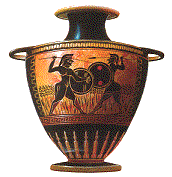"The Athenians
pushed on to the Assinarus river, all the while being devastated by
the spears, arrows and stones coming from everywhere and by the hordes
of cavalry and other troops. They thought that if they could just get
across the river, things would be a little easier for them. They were
desperate to stop the pain, to drink some water. When they got to the
river, they broke ranks and ran into it, every man struggling to make
the brutal crossing first as the enemy bore down. Driven to cross all
together, they fell onto one another and trampled each other down. Some
were killed immediately by their own spears; others got tangled up in
their equipment and with each other and sank into the river. Syracusans
positioned on the other bank, which was steep, hurled down spears at
the Athenians, most of whom were jumbled together ravenously drinking
from the nearly dry riverbed. The Peloponnesians went down into the
river after them and did most of the killing there; and though it quickly
became fouled, the Athenians nonetheless fought among themselves to
gulp the muddy water clotted with blood.
Finally, with dead bodies heaped atop each other in the riverbed, and
the army decimated, some in the river and others-such as got across-by
the cavalry, Nicias surrendered himself to Gylippus, trusting him more
than the Syracusans. He told Gylippus and the Spartans to do with him
what they wanted, but to stop slaughtering his men. After this, Gylippus
ordered his troops to take prisoners, whereupon the surviving men were
brought in alive, except for the large number who had been hidden by
individual Syracusan soldiers. They also sent a search party out after
the three hundred who had broken through the sentries by night and captured
them….A large number, of course, were killed, for there was a great
slaughter at the river, greater than any which occurred in the whole
war." |
 Remarkably,
it took the Spartans another eight years to finally finish off the Athenians.
During this time the democracy in Athens was tested by accusations of blame,
and a constant shifting political landscape between those supporting the democracy
and those sympathetic to a more Spartan-styled oligarchy. The last battle came
in the summer of 405 BC when the commander of the Spartan forces attacked when
the Athenian crews left their vessels to go on shore to gather provisions. By
the end of the day he had captured the Athenian fleet of 171 ships and overrun
their camp. So outrageous was this oversight which left the whole of Athenian
fleet defenseless there naturally were accusations of treason and other forms
of treachery levied on those in charge. (See reference to Adimantus below)
Remarkably,
it took the Spartans another eight years to finally finish off the Athenians.
During this time the democracy in Athens was tested by accusations of blame,
and a constant shifting political landscape between those supporting the democracy
and those sympathetic to a more Spartan-styled oligarchy. The last battle came
in the summer of 405 BC when the commander of the Spartan forces attacked when
the Athenian crews left their vessels to go on shore to gather provisions. By
the end of the day he had captured the Athenian fleet of 171 ships and overrun
their camp. So outrageous was this oversight which left the whole of Athenian
fleet defenseless there naturally were accusations of treason and other forms
of treachery levied on those in charge. (See reference to Adimantus below)